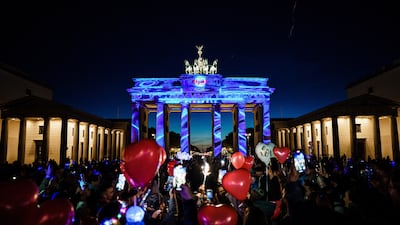Germany and the Netherlands are pushing for Europe to cut back its energy use more drastically to save money this winter.
The two countries are pressing for deeper energy savings as an alternative to a Europe-wide price cap on gas.
They also urged Europe to make progress on signing joint gas contracts, in the hope that suppliers such as Norway and the US will offer a lower price.
The crisis is playing out against the backdrop of Russia’s invasion of Ukraine and Moscow’s resulting energy standoff with the EU.
Energy ministers from the European Union’s 27 countries were discussing how to navigate the energy crisis at a meeting in Prague on Wednesday.
The question of limiting gas prices has divided the EU, with at least 15 members demanding a wholesale cap.
Others argue that capping the price would reduce Europe’s buying power on the world market, putting supplies in doubt.
Norway, a non-EU member which is one of the bloc’s main gas suppliers, said on Wednesday that it would not recommend setting a cap.
“Everybody agrees that prices now are insane,” said Roberto Cingolani, Italy’s Minister for Ecological Transition.
“But of course there are different possible solutions. We agree on the diagnosis, the therapy is still under discussion.”
German and Dutch diplomats circulated a paper suggesting measures to calm energy markets without imposing a cap.
They include joint purchasing to bring the EU’s market power to bear on the world market, an idea first proposed in March.
Fatih Birol, the head of the International Energy Agency, told EU ministers in Prague that they should already start turning their attention to filling up gas stocks next summer in preparation for another energy crunch in 2023/24.
Austria suggested Norway and the US, both Nato members, could agree to lower prices in the spirit of western solidarity in the face of Russian pressure.

“We need to finally step up and implement the common purchasing of gas,” said Sven Giegold, Germany’s representative at the talks.
The German and Dutch plan also calls for further measures to reduce demand, going beyond a voluntary 15 per cent cut in gas consumption agreed in July.
Germany said any cap on prices should not eliminate incentives for consumers to use less energy this winter.
The Netherlands said it would like to see more binding targets after claiming success in reducing its own consumption.
Gas usage in the Netherlands has fallen by 25 per cent this year, although this is not all good news because it comes partly from lower industrial production, said Dutch Climate and Energy Minister Rob Jetten.
Germany’s gas-saving measures have had less of an impact so far, with household consumption above average in recent weeks.
“We want to have substantial efficiency that can last for several years,” Mr Jetten said.
“I think every country should do its best to get this 15 to 20 per cent energy efficiency.”
European Commission President Ursula von der Leyen is expected to set out detailed proposals before EU leaders meet in Brussels next week.
Ms von der Leyen supports joint purchasing and a partial price cap on gas to reduce the cost of generating electricity.
But anything the commission proposes will have to be passed by all member states, including typically obstinate Hungary which is opposed to a price cap.

Hungarian Foreign Minister Peter Szijjarto said the EU should heed Russia’s warning that it would cut off gas altogether if the price is capped.
“We will not support any proposals which would endanger the safety of supply,” Mr Szijjarto said.
Russian exports via the Nord Stream 1 pipeline came to a halt in September, while the parallel Nord Stream 2 has yet to go into operation.
Both Nord Stream pipelines were hit by leaks last month in apparent acts of sabotage that put them beyond use for the foreseeable future.
Poland on Wednesday announced a leak on the Druzhba oil pipeline that connects Russia to central Europe, but officials said it appeared to be an accident rather than sabotage.
Germany said its eastern refineries were still receiving oil and that its energy security was not affected.


